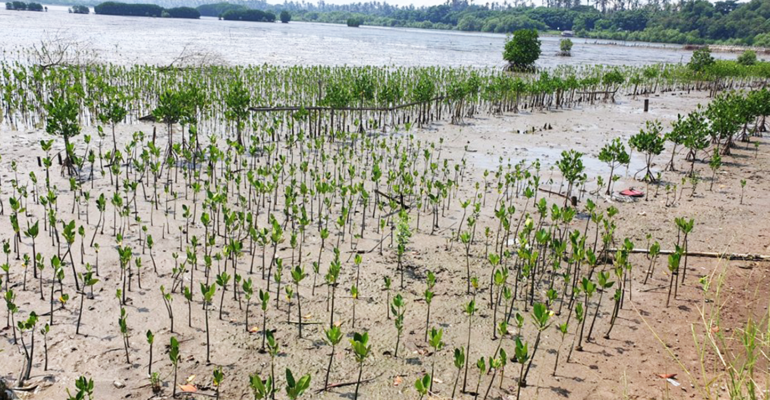IPB University MSP Students Plant Mangroves in the Integrated Mangrove Conservation Center Area, Tangerang

IPB University students from the Department of Aquatic Resources Management (MSP), Faculty of Fisheries and Marine Science (FPIK) planted 500 mangrove seedlings of Rhizophora apiculata species in Ketapang Urban Aquaculture (KUA), Integrated Conservation Center Area, Tangerang, Banten.
The planting was done in the intertidal area facing directly to the sea water.
This mangrove planting activity is a series of hands-on practices related to understanding tropical marine coastal ecosystems, especially mangrove and intertidal ecosystems. This action was also part of KUA’s long-term plan to expand mangrove forested areas.
KUA is a learning center on mangrove ecosystem conservation and empowerment. It is also a demonstration center for how conservation efforts can improve the welfare of the surrounding communities. KUA was initiated in 2015 and is part of Tangerang Regency’s flagship program, the Gerbang Mapan or Madani Coastal Community Development Movement.
Within the KUA area, conservation efforts are carried out in the form of an arboretum park for various mangrove species, silvofishery shrimp farming and fishery processing that accommodates fishermen’s catches and pond farming. At the same time, the KUA area was opened as an eco-tourism area, which provides a variety of scientific and practical information about mangrove conservation and economic businesses based on sustainable mangrove ecosystems.
The hosts of the field trip were Dr Sm Agustin M A Hari Mahardika from the Tangerang District Environment Agency and Angga STrPi from the Tangerang District Fisheries Agency. Dr Hari is one of the pioneers and founders of KUA and an alumnus of the Postgraduate Study Program of Coastal and Marine Resource Management (SPL), Department of MSP, FPIK IPB University.
In this field trip, a total of 87 MSP IPB University students practiced the research technique of measuring mangrove ecosystem analysis, which includes identification of species, tree-flinger-seedling density, tree diameter and biota associations that inhabit mangrove habitats. The lecturer who accompanied the field trip students this time was Prof Ario Damar who was assisted by several assistant seniors.
Mangrove ecosystems in addition to provisioning services in the form of providing foodstuffs from various types of fish, shrimp and shellfish, also provide the function of regulating and retaining abrasion, trapping sediments, absorbing pollutants and most recently as carbon storage.
The KUA area also provides other ecosystem services in the form of providing cultural services in the form of eco-tourism activities. This area is crowded with tourists, especially on weekends, because the mangrove area is facilitated with jogging tracks and walking paths through the dense mangrove forest.
“Equipping MSP IPB University students with the importance of coastal ecosystem management is a major part of the learning outcome of various courses in this study program, including the Tropical Small Island and Marine Coastal Ecosystem course,” said Prof Hefni Effendi, Chairman of the MSP Department of IPB University. (*/Rz) (IAAS/NYS)



